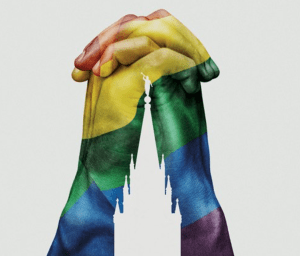My life has been uplifted and touched deeply by the brilliant series, The Chosen, on the life and message of Christ. I just saw the finale of Season Two, episode 8, which was broadcast tonight and will be available for the next 24 hours via the app or the website. All of Season One and so far 7 of the 8 episodes in Season Two are also available on BYU TV (get the app or view it on your television via Roku or other services).
I love so much about this series, including the attempts to provide reasonable backstories for some of the events and characters. Yes, there is plenty of speculation and artistic license, but it’s done in a way that at least helps us ponder the biblical account more deeply, recognizing that there may be significant background stories for many of the details in the Gospels. I love the portrayal of the humanity of Christ in the flesh. I respect the treatment of women and the efforts made to help us better appreciate the women that were part of Christ’s life and ministry.
This grand production is offered for free to the world, relying on donations via crows-sourcing, perhaps the most remarkable fruit of crowd-sourcing in the history of entertainment. I hope you’ll join me in making a donation to support the completion of Season Three and beyond (seven seasons are planned).
Latter-day Saints watching this may think it’s a Church-produced film, but it’s not. The director and co-writer, Dallas Jenkins, is not a Latter-day Saint, but I think that nearly everything I’ve seen so far can be appreciated by those in the Church. So much of it resonates with the Christ we know from our scriptures, including of course the New Testament, but also the Book of Mormon and beyond. I feel the series can be a great tool to help us appreciate the majesty of the Savior but also what it might have been like for His mortal followers to cope with the challenges of being a disciple to a Master who often disrupted their expectations and constantly took them out of their comfort zone. So many of these issues apply directly to our day as well, with those who seek to follow Him being increasingly in tension with the world around us.
This series can help us reconsider our own lives, better visualize and recall the example the Savior, better appreciate the value of those around, even those whom we may dislike or condemn. And if nothing else, watching this series will help us yearn to better understand the scriptures and the power of the Messiah’s life and ministry.
Please watch this series and share it with others. And please help it become available to more people (the goal of Dallas Jenkins is to have 1 billion people see it) by making a donation today to support this inspiring work.











I agree.. my family really enjoys watching this show and it is my favorite TV series & very much looking forward to the next few seasons. We're praying for Dallas and his team that they'll be able to complete it while continuing to get fulfillment and inspiration from it, along with the millions of fans who so much appreciate it. I also like how it has the potential to unite Christians, as opposed to so much in our modern political (and religious) climate that seeks to divide and to alienate folks from each other.
As The Chosen moves to its climax, it will be interesting to see how it handles some of the important conflicts in the NT, e.g., will Judas attempt to return the 30 pieces of silver and then hang himself, with the priests then using the money to buy the potter's field, as per Matthew? Or will Judas use the money to buy the field himself and then fall forward and burst apart, as per Acts? Or will the writers attempt to harmonize these two accounts, thereby in effect creating a third story?
If I had to bet, I'd wager that the writers split the difference. Judas will hang himself and then, when his body is cut down, the corpse will fall forward and "burst asunder."
It will also be interesting to see how the writers develop Judas's motivation, and the question of whether he is a pure villain or a mere instrument used by God to bring about the crucifixion. If I were writing the story, I'd go with God permitting Satan to possess Judas (much as he permits Satan to torment Job) and then, once the betrayal has taken place, I'd have Judas realize that he has been thus used and then — railing against God for so shabbily abusing him — commit suicide in sheer despair. But I'm sure the writers will handle Judas in a more theologically correct manner. Whatever they do, I'm pretty sure they will avoid the anti-semitic approach taken by the execrable Passion of the Christ.
It occurs to me now that two of the most interesting cinematic treatments of the passion narrative, Life of Brian and Jesus of Montreal, sidestep all these issues by writing Judas out of the story entirely.
— OK
OK, thanks for sharing the interesting thoughts. The actor playing Judas in an interview played shortly after the Season Two finale indicated that he had long been fascinated with Judas and was thrilled to get the part. It was interesting to see how he was portrayed when introduced in the finale. A very sympathetic and sincere character (so far) who had been mentored by an influential but greedy businessman. My guess is that we will see a nuanced depiction of him and the tragedy of his life in later scenes, as we have seen for Nicodemus and others.
Thanks, Jeff. In addition to the theological challenges posed by Judas, there's also the historical challenge posed by his central position in the history of Christian anti-semitism. Just as Cain and Ham have been invoked to justify slavery and racism, so Judas has been used to justify and provoke hatred of the Jews. (Anyone interested in the question of whether anti-semitism is intrinsic to or merely incidental to Christianity will want to read James Carroll's magisterial Constantine's Sword.)
This aspect of The Chosen has got me thinking more generally about cinematic re-presentations of problematic characters like Judas. (By "problematic" I mean something like "works with famous villains deeply intertwined with really bad stuff.") The best secular example I can think of right offhand is the character Magua from James Fenimore Cooper's novel The Last of the Mohicans. In the novel, Magua epitomizes the "bloodthirsty savage" stereotype used to justify Native American genocide, but in the 1992 film adaptation his character is given a lot more depth and complexity (and is wonderfully portrayed by Wes Studi, who steals the show from Daniel Day-Lewis, no mean feat).
On further thought, I guess another obvious example would be the portrayal of Shylock in the 2004 film adaptation of The Merchant of Venice.
Anyway, as I said, it'll be interesting to see how The Chosen's writers navigate these tricky waters.
— OK
The Most important things that i have noticed after reading this article is that the writing of this article is very & easy to read even a new reader can come here read & will be able to understand it. protien characterization services
Our company manufactures Vape Vaping Packaging Boxes that play an important role in maintaining your prestige in the market and giving you maximum profit. You can use our service to get vape boxes ready and you can also get a designing service on top of them which gives them a beautiful view.
The Custom Boxes is known for the best printing and packaging arrangements, particularly display boxes. These cases have undisclosed realities that are compulsory to stand a part of the opposition. Get alluring, engaging, and eye-getting Cardboard Display Boxes UK of your ideal tones and sizes.